This legislative scorecard is designed to let you know where your state legislators stand on a variety of civil rights and civil liberties issues, ranging from criminal justice to voting rights. We encourage you to review the separate scores for each issue area to see whether your legislators support your values. We hope you’ll use this scorecard to give your legislators feedback on their votes in 2019. Direct communication with your legislators is a valuable way to encourage them to stand up for our rights and freedoms. Download the printable version of the 2019 Legislative scorecard.
Go to: State Assembly Scorecard | State Senate Scorecard | Issue Areas
What to Expect in the Scorecard
This scorecard reflects whether legislators voted with us or against us on eight key issue areas in 2019, using only the final floor vote in each house of the legislature so that members of each house are evaluated on the same votes. There were 101 bills scored in the Assembly, and 96 scored in the Senate. The numbers vary because some bills that were voted on in one house did not receive a vote in the other house and some bills were counted in more than one issue area.* A failure to vote on a bill attributable to an absence, as verified by the official record, is not counted against a member. Abstentions are counted because they represent an intentional decision not to vote on a bill, which effectively counts as a vote against the bill because passage of legislation requires a majority of “yes” votes. We are nonpartisan. We do not endorse or oppose candidates for elected office, nor do we make financial contributions to candidates. We urge voters to go to the polls, informed about their choices.
How Scores Are Calculated
In addition to reporting scores on eight separate issue areas, we also report an overall score that takes account our position on all bills we support or oppose, adjusted by some key additional variables. To better reflect the extent of alignment, we adjust the overall score slightly upwards or downwards if the legislator:
- Voted with us on all the bills we supported
- Voted with us on bills we opposed
- Voted with us on controversial bills where the vote is close to 50%
- Authored or co-authored a bill we sponsored
- Authored or co-authored a bill we opposed
- Urged others to vote against a bill we sponsored on the final vote

Not sure who your state assembly member is? Find your lawmaker.
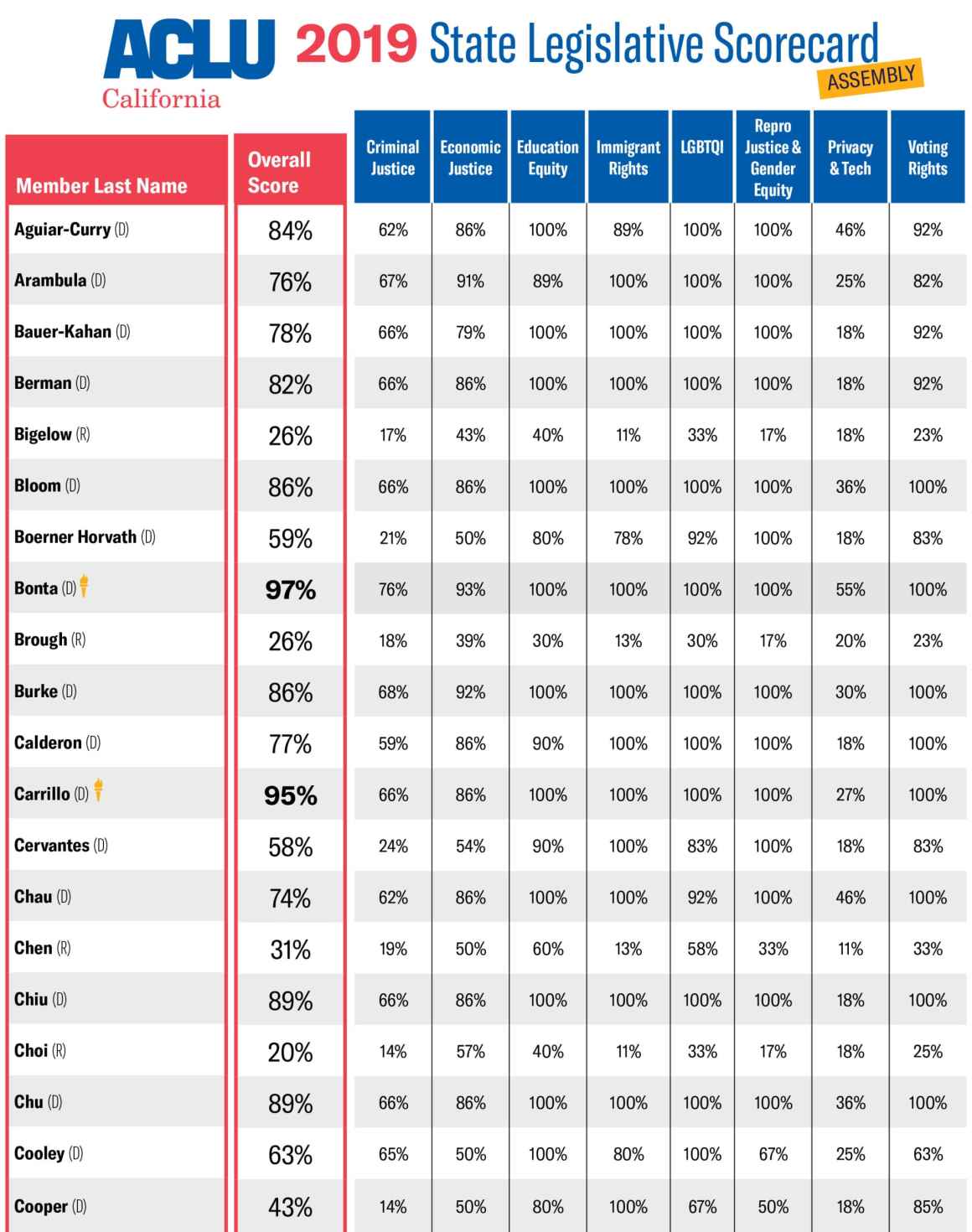
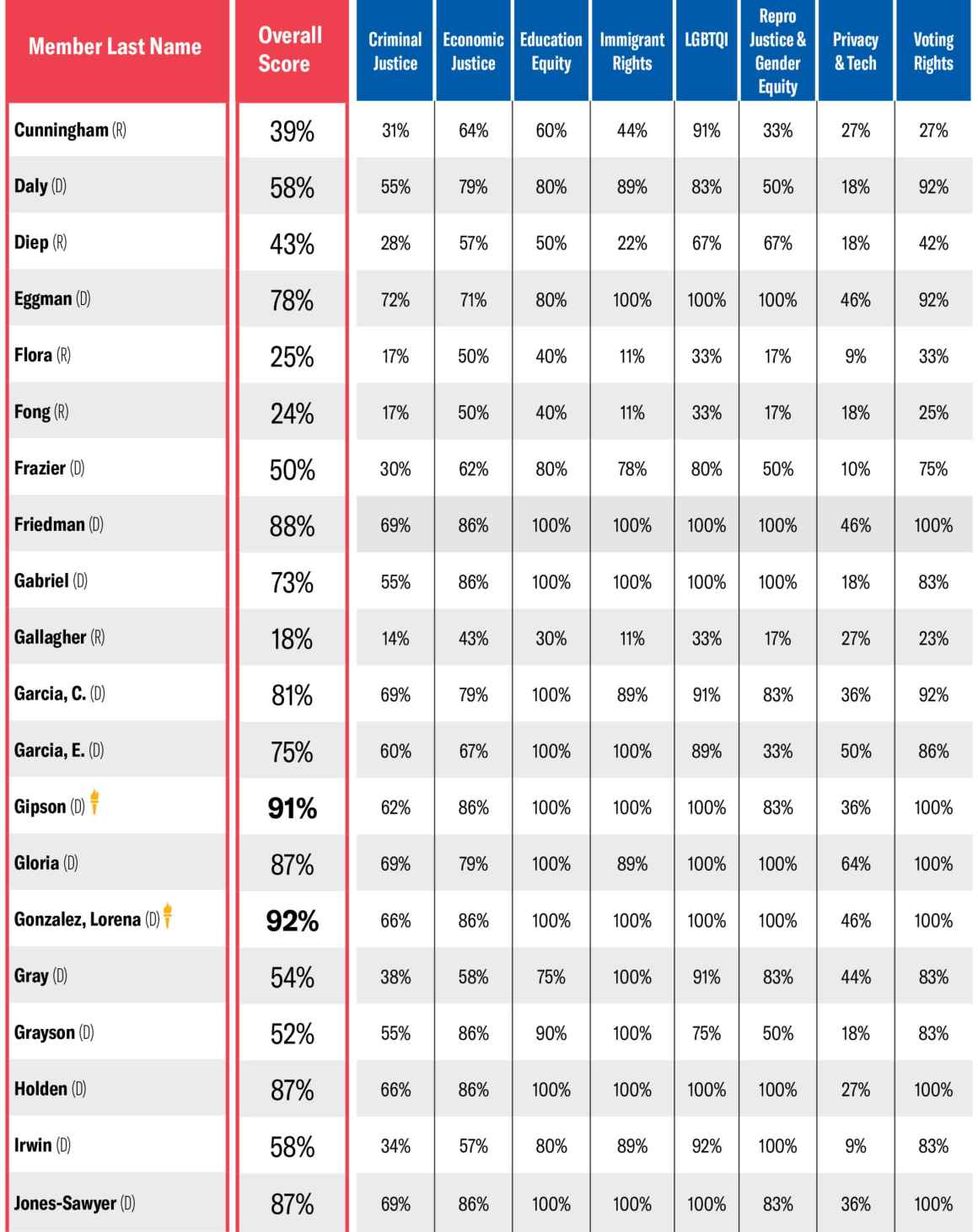
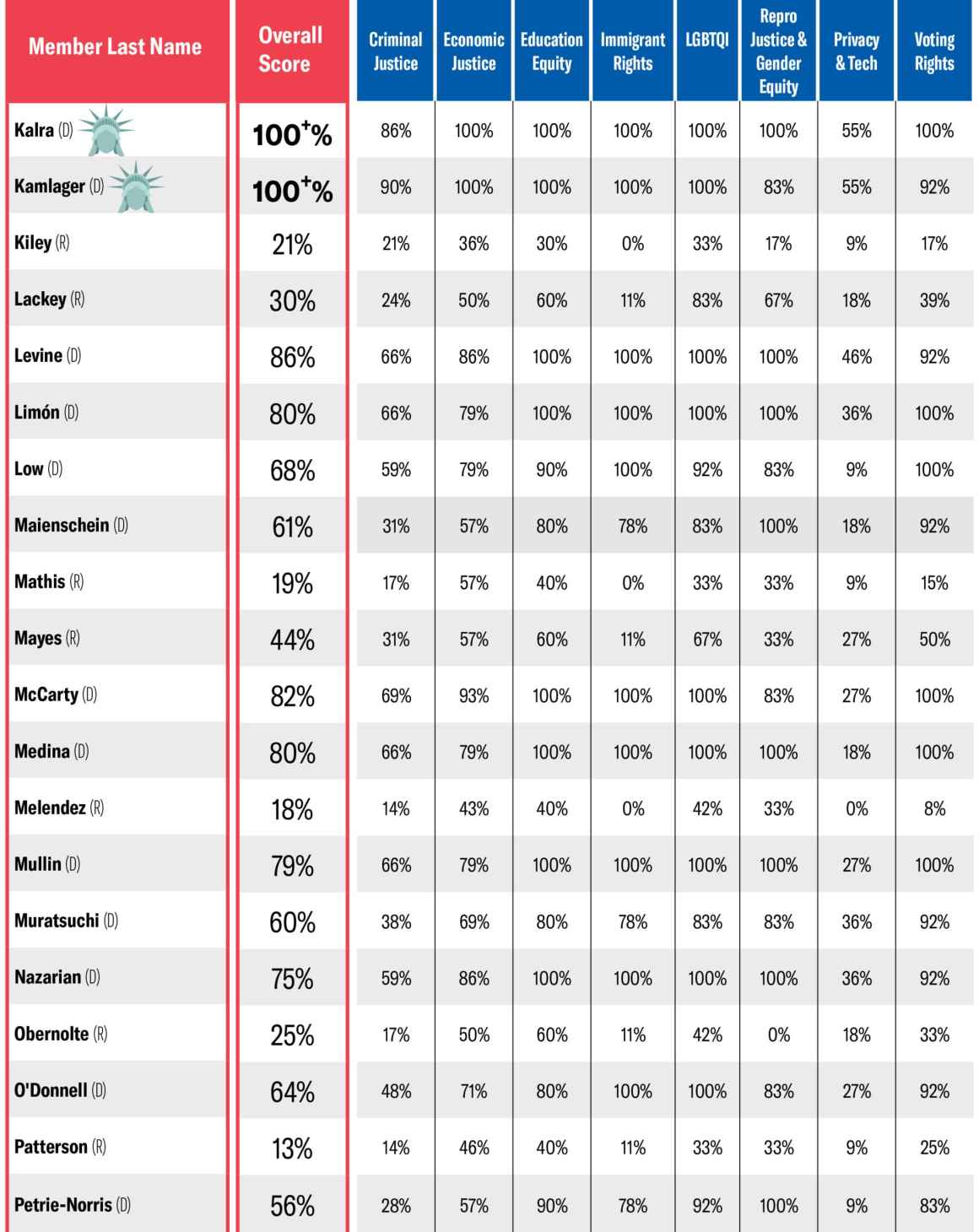
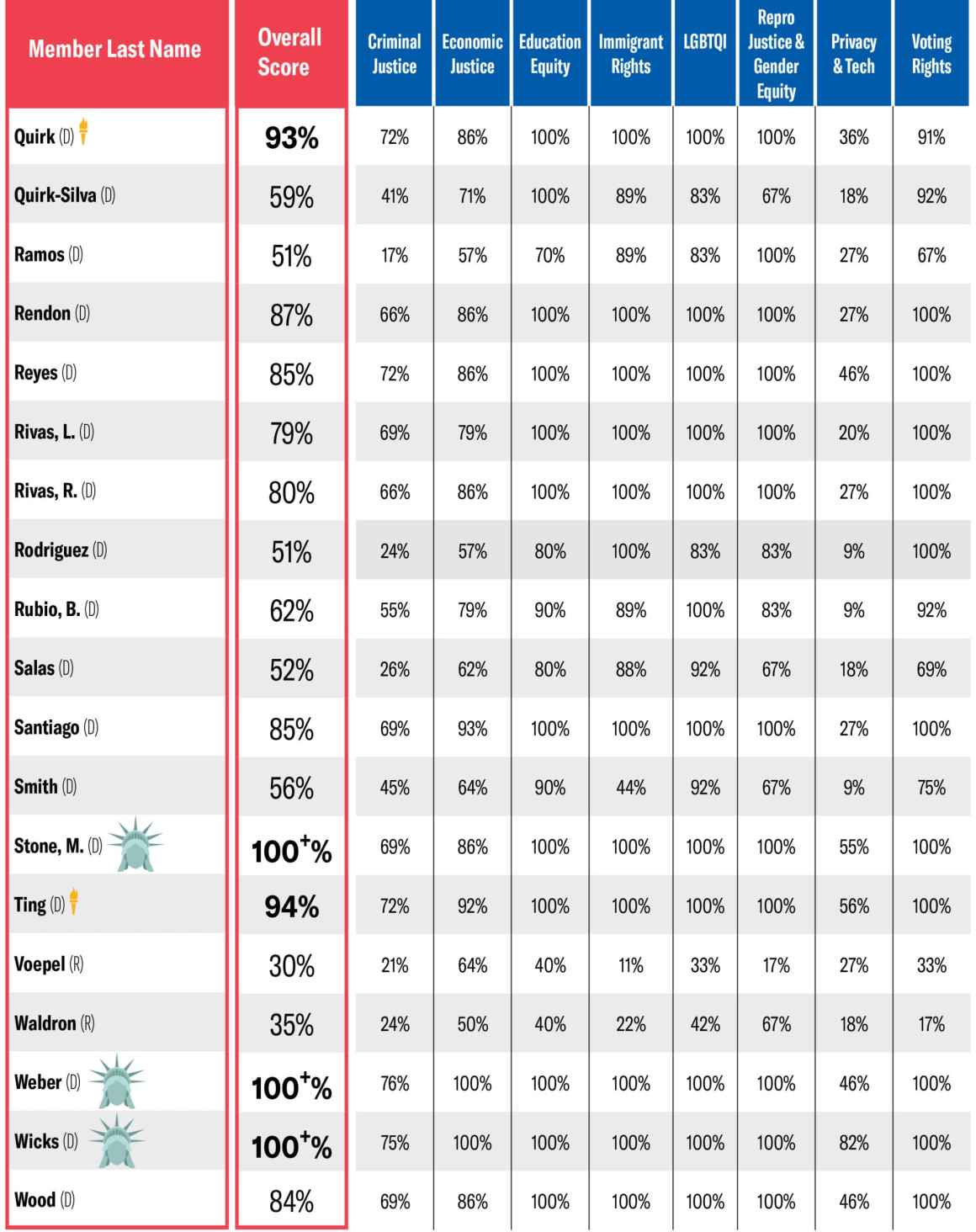
Not sure who your state senator is? Find your lawmaker.

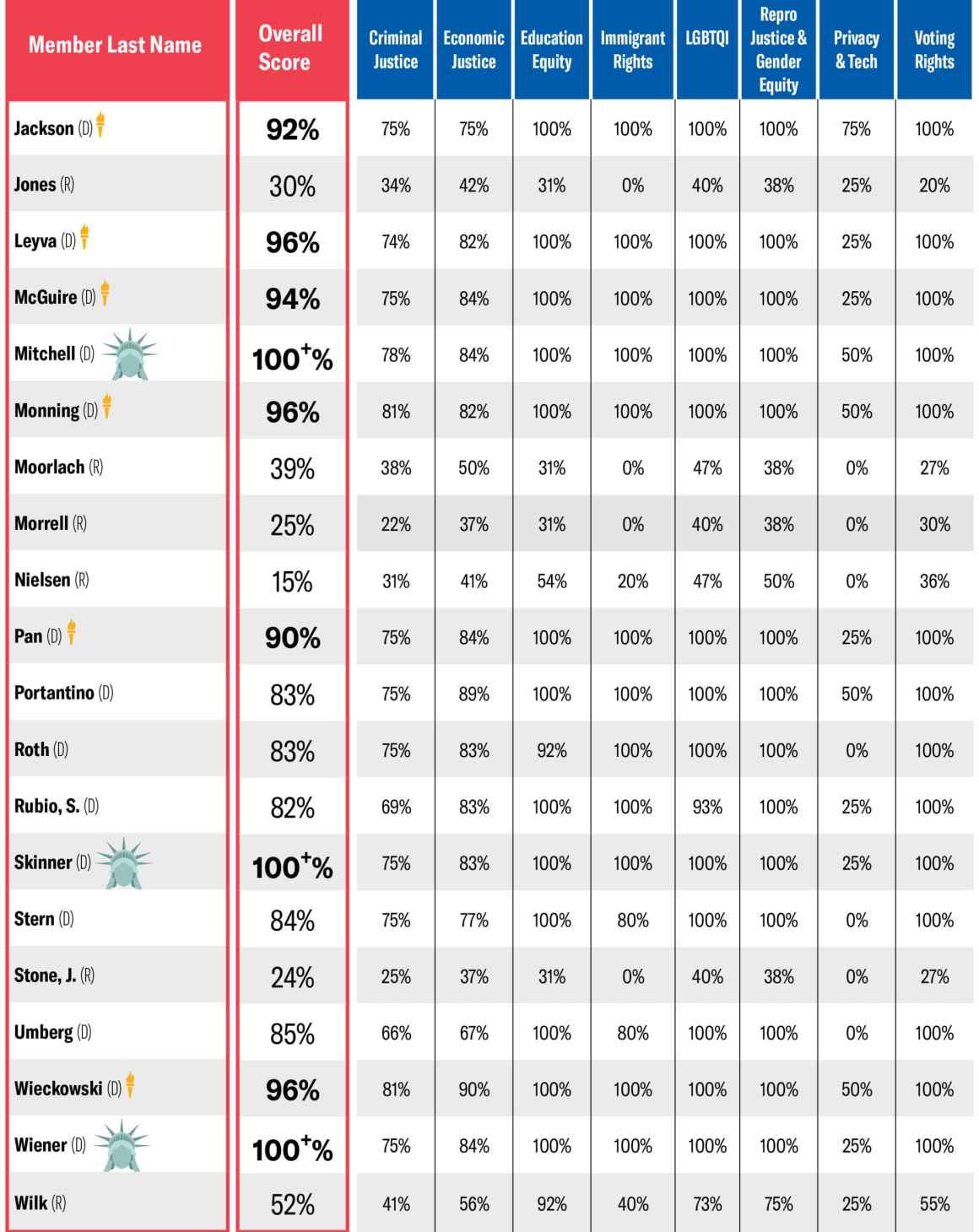
Issue Areas:
- CRIMINAL JUSTICE: The ACLU of California is committed to helping re-envision the criminal justice system so that it is fair and free of racial bias, keeps communities safe, and respects the dignity and rights of all who come into contact with it. We advocate for a criminal justice system that fosters public safety by reducing over-criminalization, mass incarceration and recidivism. We challenge broken death penalty systems, confront illegal police practices, advocate for sensible drug policy reform, and work to remove barriers to reentry, increase government transparency and accountability, and achieve effective community-based solutions and opportunities.
- EDUCATION EQUITY: All students have a legal right to an equal education. The ACLU of California supports and defends equal rights and opportunities for all California students. We fight for clean schools, safe learning environments, adequate instructional materials, and qualified teachers.
- ECONOMIC JUSTICE: Economic justice is a civil right. The ACLU of California works to defend economically disadvantaged people and fights income-based discrimination by public agencies and in housing and employment. We fight to protect some of society’s most vulnerable residents, including low-income students, people experiencing homelessness, and low-paid workers seeking equitable working conditions and living wages.
- IMMIGRANTS' RIGHTS: All the rights and liberties guaranteed by our constitution apply to all immigrants, regardless of immigration status. We challenge the serious civil rights violations faced by immigrant communities. We work to ensure that no one can be imprisoned in an immigration jail without an opportunity for a hearing; that the conditions in which immigrants are detained are humane, and that no one can be deported without a fair hearing and access to legal assistance. We seek to protect against unconstitutional searches and arrests by federal immigration agents, to guarantee that non-citizens have equal access to naturalization and other important immigration benefits, and that state officials will not be complicit in unjust federal policies.
- LGBTQI RIGHTS: The ACLU of California works to eradicate discrimination based on sexual orientation, gender identity and gender expression. The struggle for legal equality for LGBTQI people rests on fundamental constitutional principles: including Equal Protection and freedom of speech and association. We work to protect their right to speak out, to form social and political organizations, to socialize, and to produce works of art with LGBTQI themes.
- REPRODUCTIVE JUSTICE & GENDER EQUITY: We work to create a California that is free of discrimination based on gender and sexual orientation and that respects, values, and supports all Californians’ decisions about intimate relationships and reproduction. We strive to ensure equal access to comprehensive, quality, affordable, and confidential reproductive health care—including abortion, affordable birth control, and prenatal care—and that personal decisions about sexual activity and child-bearing are informed, respected, supported, and attainable. Our goals include educating adults and teens about confidential health care rights and enforcing them; reducing incarceration and improving reproductive and sexual health care for incarcerated people; safeguarding the right to choose; and ensuring that schools teach accurate and unbiased sex education.
- PRIVACY & TECHNOLOGY: Privacy is a fundamental American value and an longstanding constitutional right. The ACLU of California safeguards civil liberties in the digital world. As technology advances, we seek to ensure that protections for privacy and free speech aren’t left behind. We push back on digital censorship and government surveillance; we work to expand the right to privacy, to increase the control individuals have over their personal information, and ensure civil liberties are enhanced rather than compromised by technological innovation. The people—not the government or corporations—should determine how and when others can access our personal information.
- VOTING RIGHTS: The right to vote is the foundation of our democracy. The ACLU of California advances the democratic process by reducing barriers to registration, enforcing the Voting Rights Act, and building an educated, participatory grassroots. We work to advance democratic participation by reducing barriers to voter registration and participation through statewide election reform; ensuring that every voter is given an equal opportunity to participate in our elections; and building an educated, participatory grassroots, especially among youth, the formerly incarcerated, and communities of color.
*For the Assembly, the number of scored bills in each issue area is as follows: Criminal Justice: 29; Economic Justice 14; Education Equity: 10; Immigrants’ Rights: 9; LGBTQI: 12; Reproductive Justice & Gender Equity: 6; Privacy & Technology: 11; Voting Rights: 12. *For the Senate, the number of scored bills in each issue area is as follows: Criminal Justice: 32; Economic Justice: 17; Education Equity: 13; Immigrants’ Rights: 5; LGBTQI: 15; Reproductive Justice & Gender Equity: 8; Privacy & Technology: 4; Voting Rights: 11.
Go to: Methodology | State Assembly Scorecard | State Senate Scorecard | Issue Areas

